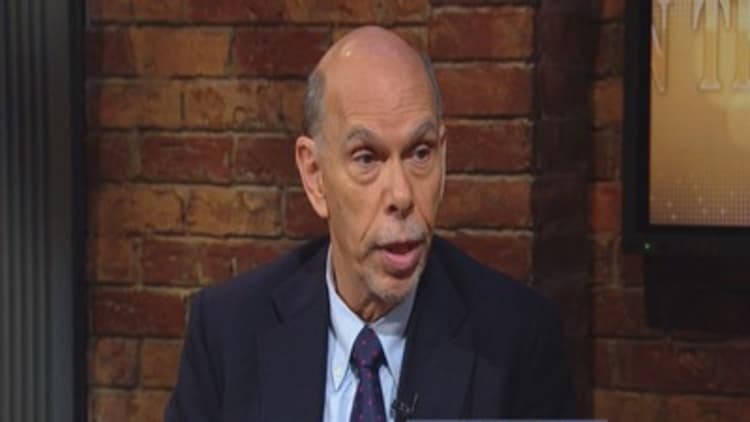
A top hospital executive believes a "death spiral" could occur if the Supreme Court rules against the health insurance subsidies in Obamacare.
In an interview with CNBC's "On The Money," Mount Sinai Health System President and CEO Kenneth Davis said about 80 percent of the patients who are on health-care exchanges get subsidies—an average of about $300 a month or $3,600 a year.
"If the subsidies are eliminated," Davis told CNBC those patients are "going to say, 'I can't afford this', so they're going to drop out."
Without those monthly subsidies, Davis estimates about 8 million people could leave the exchanges. He adds that exodus "changes the insurance pool and puts it in what's called a 'death spiral.'"
He explained there are three pillars that are essential for the risk pool in Obamacare to work: guaranteed insurance, subsidies and mandates. "If you take away the subsidies, but leave the mandate, and leave the essential component of not denying coverage, the Affordable Care Act (ACA) won't work."
In a study released Thursday, The Congressional Budget Office estimates a repeal of Obamacare would increase the U.S. deficit by $137 billion over the next 10 years. That runs counter to the claims of many Obamacare opponents that say ending the ACA would save the government money.
Davis said hospital systems like his could take a major financial hit as well.
"When this bill was all being put together, there were compromises from everybody on all sides." Davis says hospitals agreed to "take $300 billion less over the next 10 years, with the assumption that we'd be picking up all these new patients that would no longer come to the emergency room and be in the hospital for uncompensated care."
Davis told CNBC the $300 billion in government money is "cuts across the board from various aspects of the Medicare formula that reimburses hospitals." He added, "We agreed to $300 billion less with the assumption there were going to be a lot more insured people."
Everyone will hurt from a repeal
If Obamacare is upended by the Supreme Court, Davis says hospitals will again have less reimbursement for charity health care.
"It means that everybody hurts. The patients hurt and don't get care," he explained. "Hospitals hurt because these people come again with uncompensated care and they've got to be taken care of. That's the law. We have to hospitalize people until they're stabilized."
When asked how likely this scenario is, Davis said, "I can't predict what the Supreme Court will do."
Read MoreObamacare survey shows users love it, but can they keep it?
One of the components of saving on health-care spending is curbing the U.S. obesity epidemic, which the National Institutes of Health says is affecting more than two-thirds of adults.
As a result, the Mount Sinai chief called the Food and Drug Administration's decision this week to ban cholesterol-heavy trans fat a "great first step."
The FDA set a 2018 deadline for the food industry to eliminate the artificial additive from processed foods. Although the move has triggered warnings that it will eventually cost food companies billions, health advocates have embraced the ban.
Trans fats extend shelf life and add taste and texture. They can be found in any number of foods, including cookies and crackers, margarine, and microwave popcorn.
Davis says trans fats are "particularly bad for cardiac disease and plaque development." He adds they are "also a likely risk factor for cancers because those kinds of fats absorb carcinogens you don't want in your body."
Davis tells CNBC he also supports city-based initiatives for warning labels proposed in San Francisco for sugary drinks, and in New York for high-sodium meals in chain restaurants.
"I think it's a great thing to let people know the risks that they're taking. It's like what we put on the cigarette packages," he said. "We have to remember that some of these things in the food chain are the tobacco of our time."
The Mount Sinai Health System is one of the largest in the region, operating seven hospital campuses in the New York City area. As CEO, Davis leads more than 6,200 physicians and 36,000 employees.
"On the Money" airs on CNBC Sundays at 7:30 p.m.ET, or check listings for air times in local markets.



